In July of 2007, we released an in-depth report analyzing 6 months of the BBC’s coverage of the Israeli-Palestinian conflict. We found that the BBC tended to portray Israeli actions in a negative light while increasing sympathy for the Palestinian point of view. We continued our study for the remainder of 2007, analyzing an additional 129 BBC articles about the conflict. The results confirm our principle finding — BBC reporting reflects a clear bias against Israel.
BBC Reporting During 2007 – Summary of Findings:
- The BBC virtually ceased reporting on Palestinian rocket attacks while detailing numerous Israeli military operations against Gaza. In 2007, there were almost 1,500 rocket and mortar attacks targeting Israeli civilian populations, resulting in on average, one strike every ten hours. The BBC chose to publish only six articles focused on the attacks during the entire year. During the same period, fifty-six articles concerning Israeli military operations against Gaza were published.
- The BBC’s headline selection for stories focused on combat and terrorist attacks was inconsistent and favored the Palestinian side. This trend continued and even worsened. Stories about Palestinian attacks never directly named the aggressors. Instead, headlines such as “Rocket injures dozens in Israel” were used. On the other hand, in 63% of articles addressing Israeli military operations, the headline was much more clear and direct, regardless of whether the action was a responsive or defensive measure. (e.g.: “Israel strikes kill six in Gaza“).
- Images accompanying articles of combat or terrorist attacks were heavily sympathetic to the Palestinian perspective by a ratio of three to one. Images of Israelis tended to be of soldiers and attacking armored units. Images of Palestinians were mostly wounded civilians, funerals, or debris from an Israeli strike.
Balance
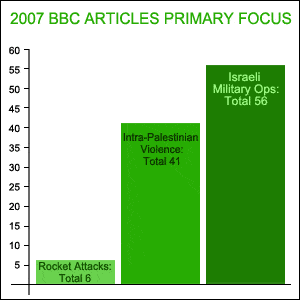
In the second half of 2007, the BBC published only two articles in direct response to Palestinian rocket attacks from Gaza making a total of only six stories on this subject over the entire year. This, despite the fact that the IDF recorded almost 1,500 separate rocket and mortar attacks for the year (30% more than in 2006).
The BBC paid more attention to Palestinian intra-violence. In 2007, Palestinians killed 344 other Palestinians and kidnapped dozens more. The BBC reported on these actions in 41 stories.
However, Israeli military operations recieved the most extensive coverage. The BBC ran fifty-six separate articles addressing Israeli military actions. Although these operations were aimed at responding to and preventing future rocket attacks, the focus of the stories was always on the number of Palestinian casualties, not the reason for the operations. Story after story highlighted Palestinian suffering. On the other hand, approximately 100 Israeli civilians were injured and two were killed by Qassam fire in 2007, not counting the thousands of cases of shock and psychological distress that accompanied the daily bombardment of Israeli cities and towns. Yet the BBC published very little about how much Israeli civilians are suffering as a result of these ongoing attacks. It would be reasonable to expect that more than 0.4% of the rocket attacks and resulting damage would receive the BBC’s attention.
Headline Style
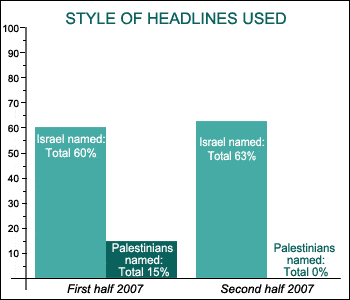 Editors often create extremely succinct headlines to refer to complicated stories. The headline can take a variety of styles:
Editors often create extremely succinct headlines to refer to complicated stories. The headline can take a variety of styles:
- An “attack” can name the attacker, the victim, or both;
- The headline can utilize a strong, active verb such as “attacks”, “kills”, “shoots”, etc.
- The headline can be more subtle i.e.: “man dies after attack.”
Six months ago we asked if the BBC’s style was consistent. We found that it was not. During the first half of 2007, 60% of articles about Israeli operations named Israel or the IDF directly as the perpetrator while only 15% of stories about Palestinian violence named the perpetrators.
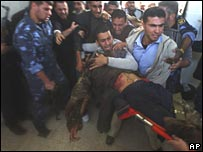 In the second half of 2007, this trend intensified. With a reduction in Israeli military actions and the failure of the BBC to give appropriate coverage to Palestinian attacks, there were only nineteen articles devoted to an attack by one side or the other (as opposed to twenty-six in the first half of the year). In 63% of the stories about Israeli operations, Israel or the IDF were named directly. Typical headlines were: “Israelis kill militants in Gaza” (The “militants” had been firing rockets into Israel), “Children killed in Israeli strike” (the children were playing next to a rocket launcher), and “Israeli strike kills four in Gaza.”
In the second half of 2007, this trend intensified. With a reduction in Israeli military actions and the failure of the BBC to give appropriate coverage to Palestinian attacks, there were only nineteen articles devoted to an attack by one side or the other (as opposed to twenty-six in the first half of the year). In 63% of the stories about Israeli operations, Israel or the IDF were named directly. Typical headlines were: “Israelis kill militants in Gaza” (The “militants” had been firing rockets into Israel), “Children killed in Israeli strike” (the children were playing next to a rocket launcher), and “Israeli strike kills four in Gaza.”
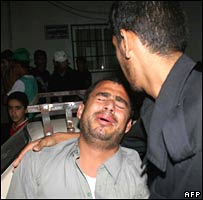 On the other hand, of the seven stories concerning Palestinian attacks, none were written in the same style. The headlines took the responsibility for the attacks away from those who instigated them. Rockets, explosions,and clashes became the culprits in typical headlines such as: “Rocket injures dozens in Israel,” “Gaza explosion kills two children” (compare with headline above), “Two killed in clash in Gaza Strip,” and “West Bank clash leaves three dead.” (This one was extremely egregious since it was describing the ambush and murder of Israeli hikers by Palestinian terrorists. Since terrorist groups took responsibility for the attacks, why weren’t they named in the headline?)
On the other hand, of the seven stories concerning Palestinian attacks, none were written in the same style. The headlines took the responsibility for the attacks away from those who instigated them. Rockets, explosions,and clashes became the culprits in typical headlines such as: “Rocket injures dozens in Israel,” “Gaza explosion kills two children” (compare with headline above), “Two killed in clash in Gaza Strip,” and “West Bank clash leaves three dead.” (This one was extremely egregious since it was describing the ambush and murder of Israeli hikers by Palestinian terrorists. Since terrorist groups took responsibility for the attacks, why weren’t they named in the headline?)
Selection of Images
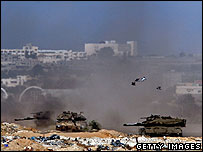 Image selection can also have a significant impact on how a story is perceived. Especially when the images reflect combat and terror attacks. As noted above, stories were often written about Israeli operations in response to Palestinian rocket attacks. Certain images could help explain exactly what had happened in an accurate context of preventing terror, while others would reinforce the notion that the Israeli actions were against civilians and undertaken with no justification.
Image selection can also have a significant impact on how a story is perceived. Especially when the images reflect combat and terror attacks. As noted above, stories were often written about Israeli operations in response to Palestinian rocket attacks. Certain images could help explain exactly what had happened in an accurate context of preventing terror, while others would reinforce the notion that the Israeli actions were against civilians and undertaken with no justification.
 During the second half of 2007, we found that images accompanying articles about attacks were three times as likely to be sympathetic to the Palestinian side. In 23 photos, 17 either portrayed the Palestinians as victims or the IDF as the aggressors. Only 6 images could be described in any way as slightly sympathetic to the Israeli perspective. (Note: These statistics do not include a 6 image exhibit showing the aftermath of a Palestinian rocket attack on an IDF base. While this free standing “in pictures” segment should not be included in an analysis of photos which accompanying news stories, it should also not be dismissed.)
During the second half of 2007, we found that images accompanying articles about attacks were three times as likely to be sympathetic to the Palestinian side. In 23 photos, 17 either portrayed the Palestinians as victims or the IDF as the aggressors. Only 6 images could be described in any way as slightly sympathetic to the Israeli perspective. (Note: These statistics do not include a 6 image exhibit showing the aftermath of a Palestinian rocket attack on an IDF base. While this free standing “in pictures” segment should not be included in an analysis of photos which accompanying news stories, it should also not be dismissed.)
Conclusions
- In 2007, the BBC showed a greater interest in covering attacks in which Palestinians were the victims than in attacks targeting Israelis. The fact that only six articles were published about specific rocket terror attacks, despite the fact that the number of attacks increased dramatically in 2007, is a glaring omission.
- The BBC is hesitant to use headlines that treat Palestinian attacks the same as those from the Israeli Defense Forces. This, despite the fact that Palestinian attacks can clearly be defined as terror attacks against civilians, and the IDF actions are clearly targeting terrorists. There is a great difference between “Israeli Planes Strike Gaza Strip” and “Rocket Injures Dozens in Israel.”
- Anyone whose knowledge of the Israeli Palestinian conflict was limited to images on the BBC website would come away with the impression that Israel was almost always the aggressor and the Palestinians the victims.
As one of the world’s top news sources, the BBC has a tremendous responsibility to report accurately and fairly. The fact that it receives public financing should make it even more accountable for its coverage. Yet every year, the BBC elicits more complaints of bias from our readers than any other news organization. Please contact the BBC here and demand more balanced reporting.
To read our earlier report on the BBC (first half 2007), click here. We plan to continue publishing long term analyses of specific media to determine whether reporting is fair and consistent. If you are interested in sponsoring one of these reports, please click here.

